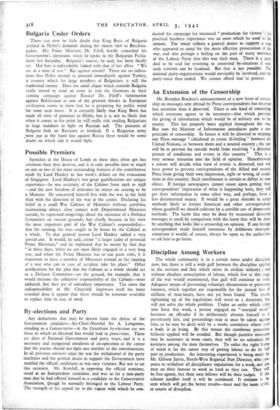An Extension of the Censorship
Mr. Brendan Bracken's announcement of a new form of censor- ship on messages sent abroad by Press correspondents has received less attention than it deserved. There is one kind of censorship which everyone agrees to be necessary—that which prevents the giving of information which would be of military use to the enemy. This has properly been applied throughout the war. But now the Minister of Information introduces quite a new principle of censorship. In future it will be directed to stopping any Press message "calculated to create ill-feeling between the United Nations, or between them and a neutral country ; the aim will be to prevent the outside world from receiving "a distorted picture of conditions and events in this country." This is a very serious intrusion into the field of opinion. Henceforward a censor will decide what view of events is distorted, and will have power to prevent correspondents of the Allied and neutral Press from giving their own impression, right or wrong, of condi- tions in this country. Such interference is certain to defeat its own object. If foreign newspapers cannot count upon getting their correspondents' impression of what is happening here, they will get their information in some other way, and perhaps from a less disinterested source. It would be a great mistake to adopt methods likely to irritate American and other correspondents whose goodwill we should cultivate by a sensible use of democratic methods. The harm that may be done by occasional distorted messages is small by comparison with the harm that will be done by anything that looks like a censorship on opinion. If any foreign correspondent made himself notorious by deliberate misrepre- sentations it would, of course, always be open to the authorities to ask him to go home.


























 Previous page
Previous page